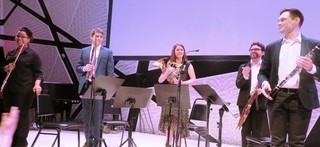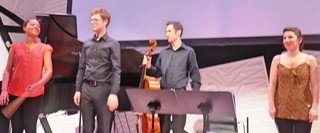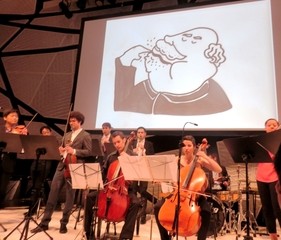|
Back
Celebration! New York
National Sawdust
06/16/2016 -
Paola Prestini: G-Force
Timo Andres: Trade Winds
David Lang: little eye
Samuel Barber: Summer Music, opus 31
The Brothers Balliett: The Seven Ages: Prologue; Mewling and Puking; Creeping Like Snail; Sighing Like Furnace; Full of Strange Oaths; In Fair Round Belly; Shrunk Shank, Slippered Pantaloon; Mere Oblivion
Ensemble ACJW: Jacqueline Cordova-Arrington, Beomjae Kim (Flutes), James Riggs (Oboe), Stanislav Chernyshev (Clarinet), Michael Zuber (Bassoon), Jenny Ney (Horn), Jean Laurenz (Trumpet), Garrett Arney (Percussion), Shir Semmel, Michael James Smith (Piano), Elizabeth Fayette, Siwoo Kim, Kobi Malkin (Violins), Dana Kelley, Danny Kim (Violas), Andrea Casarrubios (Cello)
Will Storie (Graphics)

J. Cordova-Arrington, J. Riggs, J. Ney, M. Zuber, S. Chernyshev
(© Samuel A. Dog)
Oboist James Riggs gave an entirely unnecessary introduction last night for the final concert of the ACJW, almost apologizing for bringing in Samuel Barber’s Summer Music. He conceded that it was beautiful and orchestral, but felt that...well, maybe it didn’t belong here in a concert which included composers associated with ACJW itself.
That didn’t seem right. True, the Barber was written six decades ago. Yet the three works which preceded Summer Music were equally evocative. Not exactly homages to the past, yet never the jolting breaks which we hear so frequently. The patterns, harmonies, structures were up to date. But, like the Barber, they evoked music of an earlier time, they spoke for themselves with little need for Boulez-style coded explanations.
And for the record, while Summer Music was familiar, the five wind players here played it with gusto, feeling and sometimes Barber’s understated excitement. But that goes with the Academy ACJW territory. These musicians are young, perhaps not that experienced, but with the enthusiasms, the color and that fearfully brilliant technique which makes older players envious.

D. Kelley, M. J. Smith, M. Katz, A. Casarrubios (© Samuel A. Dog)
Even when not playing their own instruments!
David Lang had written little eye for “Cello and four non percussionists”, so violist Dana Kelley, trumpeter Jean Laurenz, cellist Andrea Casarrubios, and pianist Michael James Smith played various tinkly things (Mr. Smith played single piano notes while rubbing a rusty-looking can), all to the repeated arpeggios by cellist Michael Katz.
The result was atypical David Lang. He is usually immersed in words-as-music. Here it was purely music. The cello was lulling, and the various celestas and xylophones gave their sounds like single raindrops–or snowflakes–at unrelated intervals. This was part of a David Lang composition called Baby, and it had a childish but always endearing sound. Not exactly old-fashioned, but harking back to our first sounds.
One had the same feeling of going back in time–this unconsciously–with Timo Andres’ Trade Winds, written for the unlikely septet of string quartet, piano, percussion and clarinet. It began and ended with a chaconne, led by the clarinet. But the center passacaglia was the emotional core.
It began almost as a lament, but as the theme was repeated over and over again, it became more intense, richer, it literally crept up on this listener, beginning with a few threads and going onto a rich multi-hued Middle Eastern carpet.
(I use that metaphor by design, since the theme sounded vaguely Semitic.)
The opening G-Force by Paola Prestini was a string quartet with vibraphone. Structurally, it was amorphous to this first-time listener, but harmonically, G-Force frequently reverted to late 19th Century harmonies. Never out of place, simply, never jarring but always inevitable. Well worth hearing again, perhaps with some explanations by the composer.

ACJW Ensemble, W. Storie picture (© Samuel A. Dog)
The final work was a world premiere by the Brothers Balliett, identical twins, masters of their own instruments (bassoonist and double-bassist), frequent collaborators with ACJW. In this case, they were commissioned to write one work as a celebration of the entire ACJW ensemble: all the strings, winds, brass, percussion, leaving out nobody.
For this, they enlisted the writer/actor Will Storie, who developed the mordant yet Thurber-like line drawings for The Seven Ages, based on Shakespeare’s Seven Ages of Man. As you can see from the sections listed above, these were not exactly reverential–Mewling and Puking, Sighing Like Furnace etc. But boy!, did they give a chance for everybody in ACJW to show their stuff.
The opening prologue was very Stravinsky-like (Soldier’s Tale style), the rest was visceral, funny, had some terrific solos (Jacqueline Cordova-Arrington’s flute was extraordinary), highly percussive and...well, just superfine music. Without any reservations.
Since it is unlikely such an ensemble as this ACJW will get together again, Doug and Brad Balliett may not hear their work again. One would hope for a video, for a YouTube of this celebration. A celebration of happy inspiration written for a wondrously deft ensemble.
Harry Rolnick
|